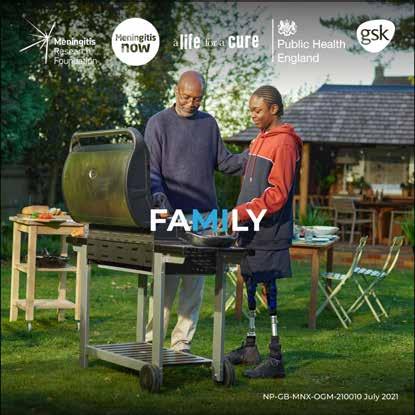
9 minute read
Awareness
Talking about the risks, signs and symptoms, how to prevent meningitis through vaccines, and the importance of acting fast when it strikes, have always been the cornerstone of our awareness activities. We also strive to reach out to people and organisations across the UK to make them aware of the support we can offer, and through our public affairs work, we seek to influence positively decisions taken by politicians, policy-makers and health and care professionals, including scientists and pharmaceutical organisations. These were challenging aims in 2020-21, as a consequence of the distractions and disruptive effects of Covid-19. Yet there were also significant opportunities and emerging needs that became evident across the year, and we were successful in addressing these – including working more closely than ever before with partners. As our Keep Meningitis in Mind survey revealed, there was also a pressing need to provide information about Covid-19 and meningitis and to keep people updated about how we could help them during this difficult time.
Communicating Awareness during Covid-19
We adopted a reactive and a strategic approach to raising awareness of meningitis. In the early stages of the pandemic, for example, evidence from the NHS showed a significant drop in A&E visits compared to the previous year. Concerned about the impact this might have on the diagnosis and treatment of meningitis, we supported and amplified messages encouraging people not to refrain from seeking medical help if they were seriously concerned about their own health or that of others. Using blogs, social media posts and press releases, we supported similar messages from the NHS and public health authorities to encourage people to take-up their routine vaccinations, as evidence from a number of sources indicated a dropping-off of vaccine take-up rates. Our Keep Meningitis in Mind survey also indicated that people had specific concerns about how Covid-19 might affect those people with experience of meningitis. A dedicated Covid-19 page on our website received nearly 70,000 visits – making it the fourth most visited page during the year. We continued to pursue our core awareness activities using a variety of channels and campaign approaches. This enabled us to reach both ‘at risk’ groups and the wider UK population with lifesaving awareness messages. For example:
• We distributed over 485,000 signs and symptoms cards to new and expecting parents via our partnership with Bounty. • Our social media community continued to grow, increasing by 10% year-onyear to 133,000. In line with expectations, much of this growth came from
Instagram, which alone grew to nearly 8,500 followers. • Over 550 articles in the traditional press and broadcast media were published with reference to Meningitis Now. Whilst this is significantly down year-onyear (2,900 in 2020), the level of coverage achieved exceeded expectations – with all UK adults having the ‘Opportunity To See’ (OTS) articles mentioning
Meningitis Now eight times over the course of the year.
• Our website was visited on average 2.2 times every minute. Our ability to reach new audiences was reflected in the fact that the rate of new visitors to the website was 80%. That said, the total number of website visits was 1.2 million, a drop of a third compared with the previous year. Much of this decline can be explained by changes Google made to its search algorithm in January 2020 and the introduction of ‘health cards’ in March 2020. These changes reduced clickthrough rates, as people could see disease information directly on their Google browser without the need to click through to any particular website. • Our programme of working in partnership with UK universities, the Meningitis Awareness Recognition Mark (MARM), was paused due to Covid-19. Despite this, universities continued to engage with us in raising awareness of meningitis and helped us to distribute more than 100,000 signs and symptoms materials (including cards and fridge magnets) and 82 packs of digital materials designed specifically for university and college students.
Don’t assume it’s Covid!
For many years, we have targeted students and young people as a group considered to be at particular risk of meningitis. But 2020-21 was going to be different. In the early part of the Covid-19 pandemic, it became evident that lockdown and social distancing had significantly reduced the incidence of meningitis across all ages, and yet it was uncertain what would happen once students returned to campus in the autumn. What was clear was that, whilst many young adults may have been MenACWY vaccinated at school, most would not have received a MenB vaccination. And whilst everyone was concerned about the risks of Covid-19, we were worried that young people might easily mistake the signs and symptoms of meningitis for Covid-19 and therefore fail to take the potentially lifesaving step of seeking medical help. We therefore developed a simple and clear message to students and young people: ‘Don’t assume it’s Covid’. We called for people not to self-isolate without first checking that their illness was not anything more serious – and to seek medical attention if they or a friend was ill and if they were unsure of the cause. Our worst fear was that self-isolation could prove fatal for someone experiencing meningitis.
Don’t assume it’s COVID
Feeling ill? Call your GP or NHS 111 straight away
It might be COVID-19, but it could be meningitis
Meningitis is a medical emergency, so it’s vital you act fast.
Don’t assume it’s COVID-19 – call your GP or NHS 111 to make sure.
We launched our campaign with the powerful and moving story of Ben de Souza. Ben was a first-year student at the University of Portsmouth when meningitis struck. He was a fit and healthy young man, whose dream was to join the Royal Navy as an officer. But just one month into college, Ben became unwell, disorientated, and confused. He was told that it was just a hangover, but Ben’s flatmates weren’t convinced – and it was their quick thinking and speedy action that saved his life. Ben, who had been given the MenACWY vaccine as a teenager, had in fact contracted MenB – a strain of the disease he was not vaccinated against. After being taken to hospital by paramedics, he was described by doctors as the sickest patient in the hospital. Ben was lucky, and eventually made a full recovery. But as Ben’s experience shows, it is easy to mistake the signs and symptoms of meningitis for something far less harmful – and had Ben been ill during the Covid-19 pandemic, he might have self-isolated with potentially devastating consequences.
Ben’s story was the centrepiece of what proved to be a hugely successful campaign, with Ben’s mum, Arlene, joining Michelle Bresnahan, who lost her son Ryan to meningitis in 2010, featuring in 164 radio broadcasts. Ben’s story also featured in 30 press articles, including the Daily Mail and the Daily Mirror. As a result of this campaign, as well as Meningitis Now’s partnership with over 100 UK universities, over 100,000 signs and symptoms cards and fridge magnets were distributed to UK universities, and 82 universities downloaded digital information materials for sharing with their students. Results • 164 radio broadcasts/24 hrs of coverage including Sky News. 40 million listeners • 30 press articles including features in the Mail and Mirror giving an OTS of 1.8 times • 14,000 social media reach, 7% engagement versus sector average of between 1.5 & 2.5% • Over 100,000 signs and symptoms assets ordered, 82 universities downloaded and used digital packs and 402 parent packs ordered

In October 2019 we initiated an ambitious project to bring together a partnership of diverse organisations, each with a common interest in raising awareness of meningitis. This group, which included the NHS and Public Health England, pharmaceutical companies such as GSK, Pfizer and Boots, and charities including the Meningitis Research Foundation and a Life for a Cure, met in London in February 2020 and agreed to work collaboratively by sharing expertise and resources to support improved meningitis awareness in the UK. The collaboration, or ‘Roundtable’ as it became known, agreed to work together on a meningitis awareness campaign targeting students and young people in an area where a low uptake of the MenACWY vaccine had been recorded.
The partners developed a plan for a London-focussed awareness campaign using creative materials produced by GSK. A Task and Finish Group was created, as was a partnership agreement to ensure good governance. This agreement recognised the different, but equal, value of each partner’s contributions. It was also agreed that evidence of impact, and a focus on shared learning, would be key aspects of the project.


The reimposition of a national lockdown in January 2021 meant that initial plans for the start date of the campaign had to be postponed to August 2021. However, this allowed more time for creative collaboration and for engagement with NHS and Public Health England teams in London. The project has been shared with the Department of Health and Social Care and the Association of British Pharmaceutical Industry as an example of best practice, and – at the time of writing – plans are already underway for a new campaign in 2021-22.
Since 2017, we have been pursuing improvements in the diagnosis and treatment of meningococcal disease by working alongside health and care stakeholders and families affected by the disease through the Meningococcal Working Group. In 2019, the Department of Health and Social Care (DHSC) published a report with recommendations aimed at improving the culture and practice of diagnosis and treatment of meningococcal disease in frontline healthcare settings, and since then, we have continued to work to progress these aims. As a result, in July 2020, we joined the NHS England Acute Deterioration Board, which has been designated to oversee the MWG recommendations, and continue to work hard to effect change across NHS England, particularly in the area of patient and carer ‘worry and concern’. A particularly welcome aim is to change and improve NHS culture and practice by ensuring patients and carers are listened to better.
National Vaccine Strategy and NICE Guidelines
Work led by the Department of Health and Social Care towards the creation of a national vaccine strategy has been delayed by the Covid-19 pandemic. However, we remained active in this policy arena through participation in events led by think-tanks such as the International Longevity Centre at the House of Lords in March 2020 and by key players such as Pfizer, who launched their ‘Vaccination Vision’ for the UK in summer 2020.
We continue to be stakeholders in two NICE (National Institute for Health and Care Excellence) guidelines that are in development, and have taken an active part in the scoping exercise for the following projects: 1. Meningitis (bacterial) and meningococcal septicaemia: recognition, diagnosis and management. This is due for publication in October 2023. 2. Vaccine uptake in the general population. Publication due in April 2022. Both guidelines have been delayed due to Covid-19 but are now progressing with revised publication dates.
DEFEATING MENINGITIS BY 2030 A GLOBAL ROAD MAP

A Global Roadmap to Defeat Meningitis
We were delighted to see the World Health Organization adopt a ‘Global Roadmap to Defeat Meningitis’ at the World Health Assembly in November 2020. Approved by 194 Member States, this represents a significant way forward for co-ordinated action across the world to defeat meningitis. This roadmap includes three goals: to eliminate epidemics of bacterial meningitis; to reduce cases of vaccine-preventable bacterial meningitis by 50% and deaths by 70%; and to reduce disability and improve quality of life after meningitis of any cause.








